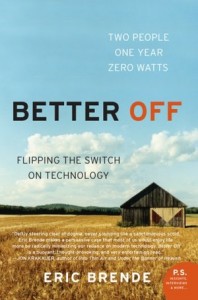for all of the nights you need something to fill the void or to help you unwind

Tuesday, October 2, 2012
Better Off: Flipping the switch on technology
I forget when I first purchased Better Off by Eric Brende, but I recently thanked myself for doing so. I originally bought the book figuring that it might work well for some of my students for the unit I have based around a biography/autobiography. Because I'm an enviro-nerd and I know a few of my students are also enviro-nerds, I figured the book might be a refreshing change of pace from the usual my-life-is-awesome-/ my-life-used-to-suck-biography.
The premise is that Eric Brende documents his research of what it's like for a recent college grad to live without electricity on a small farm in a community full of others who have vowed to stay off the grid. Brende and his wife spend 18 months learning the ropes of the community and of existing without being dependent on electricity and for the most part without any reliance on fossil fuels.
Eric, an MIT grad, joins with Mary and they are set up on a small farm in a community of Amish farmers. Eric and Mary soon realize that in order to learn the ways of their community, that socializing takes place during work sessions in the garden, at barn raisings and in the kitchen canning and cooking. Rather than most people setting time aside for socializing, this community uses communal tasks to get to know one another. Eric also realizes that the work no longer feels like work when there are others involved. He compares it to Tom Sawyer and white washing.
While learning about farming and beginning to rely on their bikes, Eric and Mary shed numerous pounds and realize that they're more fit than before. They also start to realize that they aren't the only ones in the community who have chosen to move in to take advantage of the community closeness and to liberate themselves from the shackles of energy consumption.
As the story progresses, Mary becomes pregnant and the two prepare for the pregnancy while farming pumpkins and they even purchase a horse and buggy. There were a couple things that struck me about the story: 1. Eric worked largely with the men and Mary worked largely with the women so it seemed to me that in some ways both were missing out on the knowledge of the work the other genders were participating in. I realized that I'd be bummed if I wouldn't be involved in the field and barn tasks because of the division of labor based on sex (though Eric gets into a debate about this exact topic with some scholars and he refutes it by stating that it's not patriarchial, but instead that often the women shoo off the men because the men haven't completed to cooking, cleaning, etc. to the ladies' standards). 2. I appreciated the Eric admitted that he and Mary sometimes used the car for get-a-ways even though he knew that it was wasteful. I appreciate that he didn't keep that from his readers and I think it shows how ingrained travel is with our cultural expectations. I'm glad he showed this restlessness and the emotional side of consuming energy, which I feel like rarely gets addressed. 3. I would have liked to see some of Mary's thoughts incorporated into the book to give her perspective as well. It would have been very interesting to see one chapter by him and then a chapter by her based during the same time frame in order to get a variety of perspectives on the experiment. I fee like the diversity of perspective based on her gender could be another great layer to the topic.
Next up: Deep Economy by Bill McKibben (another enviro-read!)
Subscribe to:
Post Comments (Atom)

No comments:
Post a Comment